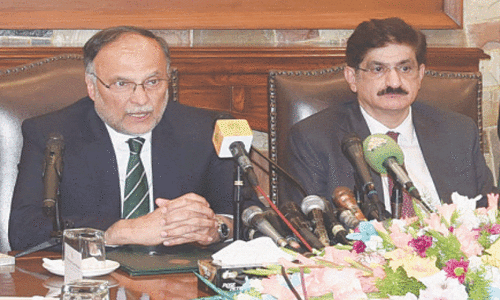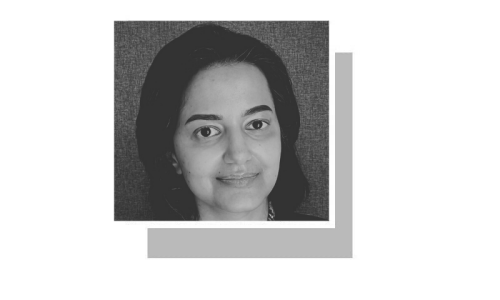LAST week was not particularly a very pleasant one for Karachi and Karachiites as the fallout of the recent disturbances in the city continued in one way or the other. However, some Japanese scholars and their students dared it out and landed in the city to gather some material for their ongoing research projects.
The visitors included three scholars, two from the Kyoto University and one from the Osaka University. And accompanying them was a PhD student from the Kyoto University and a research student from the Osaka University. It was nice to see that both the young students were very keen to learn more and more about Urdu language and Pakistani culture. Talking to them — amidst the rare books and manuscripts they were poring over at Prof Dr Moinuddin Aqeel’s huge personal library — was an enlightening experience. Discussions with them on several topics continued as this writer rejoined them later in the evening at an Iftar dinner writer Muhammad Hamza Farooqi had arranged in their honour.
It was a pleasant surprise to know that it is considered quite normal in Japan for a scholar to know several languages and one can expect a Japanese scholar to know as many as ten languages. For instance, one of the visitors, Dr Tonaga Yasushi, a professor of the Study of the Islamic World and the deputy director of the Centre for Islamic Area Studies at the Kyoto University, knows Turkish, Persian, Arabic, Chinese, German and Italian, not to mention English and his native Japanese. In addition to Islamic Studies, he is an expert on the history, cultures and languages of the Islamic world. Another area of study that fascinates him is mysticism and Sufism. When asked how he became interested in Islamic mysticism, he said that he was keenly interested in mysticism since his childhood. Later, he studied Chinese mysticism, Taoism and Sufism and graduated in Islamic Studies from Tokyo University. Here he met and was deeply impressed by Prof Toshihiko Izutsu, an expert on Islamic Studies who had profoundly studied Imam Ghazali’s philosophies and the aspects of Islamic mysticism. Prof Izutsu later supervised his PhD thesis.
Born in 1960 in Japan’s Mie prefecture, considered cradle of Shintoism, Prof Tonaga went to Egypt for higher studies and also carried out research on Ibn-i-Arabi’s theories on Islamic mysticism and ‘tariqat’. His works include a research on ‘Tariqah Movement’. He feels there are many aspects of Islamic Sufism that must be brought before the Japanese people as tolerance is one of the virtues and lures of Sufism. An interesting aspect of Prof Tonaga’s research is that he did not confine himself to sheer academic interest in Sufism and learned different ways of meditation. He practised Islamic Sufism while in Egypt and wanted to be admitted into a ‘silsila’ (order of Sufis).
One of Dr Tonaga’s recent research works is a bibliography of the books written on Ibn-i-Arabi all over the world.
Prof Dr Imamatsu Yasushi is another scholar who has a deep interest in Islamic mysticism. A visiting professor at the Centre for Islamic Area Studies at Kyoto University, he is also an expert on Turkey, its culture, language and history.
Born in Osaka in 1963, he received his early education in Kobe and graduated in Oriental History from Kobe University. Later, he earned his master’s and doctoral degrees from the same university.
Prof Imamtsu had come to Pakistan some 11 years ago and during his first visit he had been to many Sufi shrines, comparing them with the shrines in Turkey.
Prof Yamane So is not a stranger to Pakistan neither is Pakistan an strange country to him. In fact, we can call him half-a-Pakistani as his impeccable Urdu and fluent Punjabi with a barely traceable Japanese accent make him appear quite at home in Pakistan. A very jolly and vivacious character, Prof Yamane got his diploma in Urdu from the Punjab University Oriental College and MA in Urdu from Osaka University in 1989. His frequent visits and stay in Pakistan for many years has perfected his Urdu, so much so that he not only appreciates Urdu maxims and the nuances of Urdu idioms but can also enjoy Urdu’s latest slangy expressions and informal parlance. As a result of his huge reading and a deep love for poetry, he composes beautiful Urdu poetry under the penname of ‘Yasir’ and can discuss with you Urdu’s meters and prosody, a rarity even among many native scholars of Urdu.
His dissertation on Urdu short story writer Ghulam Abbas has been published and a mention of his works on Urdu would require a long list. His recent works include some research on Urdu orthography and Urdu script. Another work of his is the first volume on the Islamic history of South Asia, published in a series in the Japanese language, aimed at presenting the history of Islam for common Japanese readers. Sunaga Emiko is a PhD candidate and a research fellow at the Graduate School of Asian and African Area Studies at Kyoto University. Having graduated in Urdu from Tokyo University of Foreign Studies, she is here to collect some research material for her doctoral dissertation that aims at discovering the impact of print media on Islam in South Asia.
Meeting these Japanese brimming with academic spirit was very refreshing as equally heart-warming was their love and appreciation for all things Pakistani.
drraufparekh@yahoo.com














































